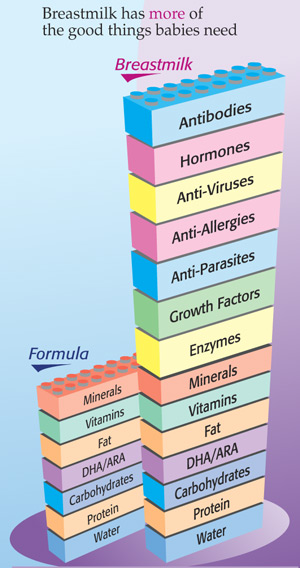
Breastmilk vs infant formula - click on the image to view the full document on the California Department of Public Health website
Just a few days ago I ran across an online discussion in which a mom blurted out that infant formula was “just as good as breastmilk”, since it contains the same nutrients. She wasn’t able to breastfeed her baby because of the medication she was taking, and thought formula worked just fine. In a way, she’s absolutely correct. Infant formula does what it’s supposed to do: it feeds babies with the basic proper nutrients and helps them grow. And for mothers who have physical limitations to nursing, formula can be a life saver.
The truth is, 90% of mothers don’t have these limitations, yet only 75% of them choose to breastfeed after birth. The numbers trickle down quickly and only about 25% of moms still breastfeed after six months. This is sad news because even though breastmilk and infant formula share many similar nutrients, breastmilk offers many more valuable ingredients that will never make it into industrially-processed formula (see chart on the right).
I think all moms who have breastfed their babies for a year or more will tell you the same. Yes, nursing is a tough habit to pick up. It does take a lot of practice, for both mom and baby. It does require commitment and huge amounts of support, especially from your partner, your family, nurses and pediatricians. Breastfeeding is a challenge, but one that women around the world have taken on for tens of thousands of years. And breastfeeding is usually cheaper than formula. A mother will spend a few hundred dollars in extra food for herself and possibly a breastpump, but it doesn’t compare to the average $1500 spent on infant formula for the first year.
With infant formula manufacturing companies heavily marketing their products (after all, they do make billions of dollars from it yearly!), 80% of hospitals releasing new moms with formula samples in their diaper bags, and an overall lack of education and support, making the choice to breastfeed is an uphill battle. And honestly, it shouldn’t be this difficult to do what our bodies were meant to do. But in 2011 it seems to be harder than ever.
If you’ve nursed your own babies and believe in the value of breastmilk, look around you and see who could use your help. Sometimes, one highly supportive person is all it takes to put a new mom on the right track.
As Mother Theresa once said, “Never worry about numbers. Help one person at a time, and always start with the person nearest you.”
If you enjoyed reading this post and would like to receive future postings, please enter your email address and click the Sign Up button at the top right of this page. Thank you for reading!


































